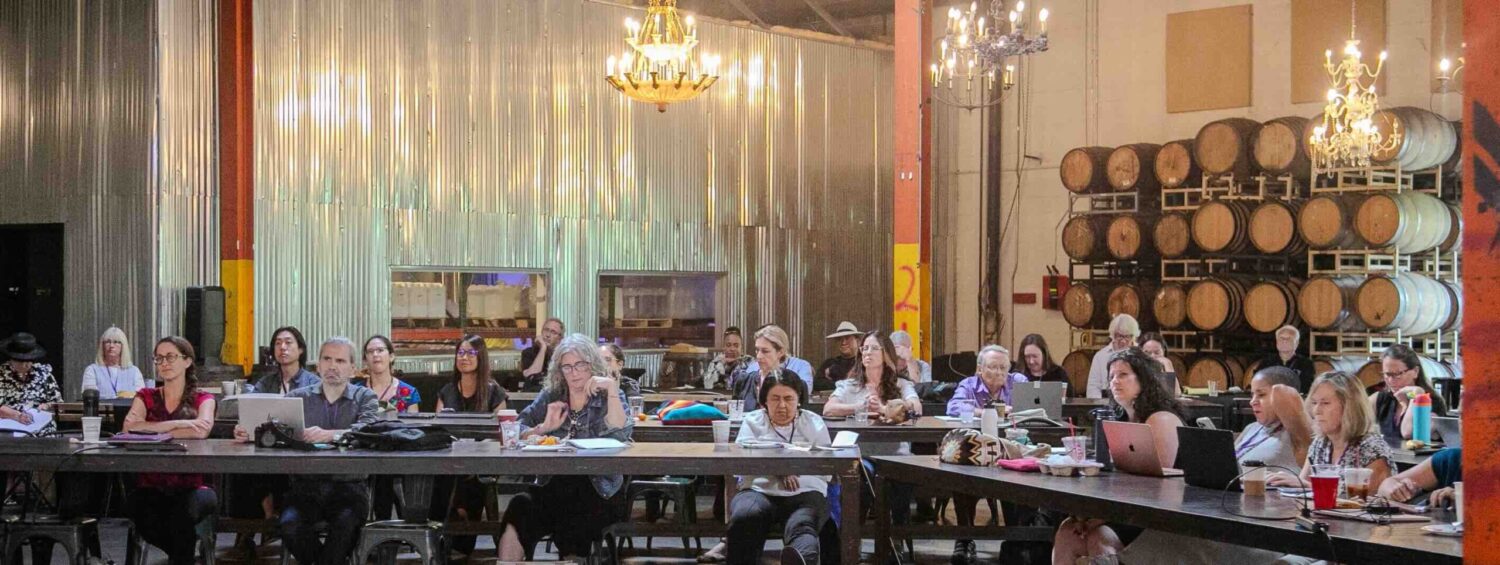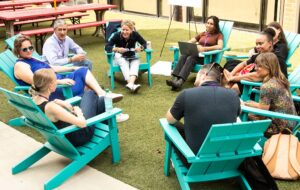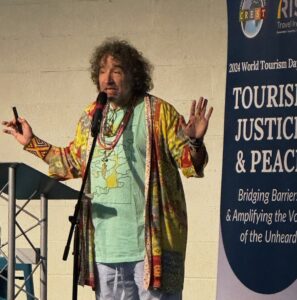Wes Espinosa, CEO of our partner CREST, explains why the structure of the innovative 2024 two-day meeting he organized in Atlanta models the collaborative principles of good destination stewardship, up close and personal.

How a tourism event can demonstrate community engagement for destinations
In September 2024, CREST held its annual World Tourism Day Forum, but this time we tried something new. In addition to convening it in Atlanta, GA, we designed the two-day Forum to break traditional molds of tourism conferences, challenge conventional thinking, and, perhaps most importantly, push attendees toward productive discomfort.
Why did we do this?
Over the last half-decade, the team at the Center for Responsible Travel (CREST) has worked on a wide range of destination stewardship initiatives, encompassing thought leadership, planning, and on-the-ground implementation. Whether working in rural communities with nascent visitor economies or in regions grappling with overtourism, we’ve consistently found that meaningful community engagement and active listening are universal foundations for successful destination stewardship.
These lessons inspired us to embed similar principles into the design of our Forum.
We convened it under the theme Tourism, Justice, and Peace: Bridging Barriers and Amplifying the Voices of the Unheard. Drawing from our experience, we sought—both deliberately and somewhat unintentionally—to recreate the engagement process that guides our destination stewardship work. Why? Because addressing complex, sensitive themes like justice and peace requires fostering cross-sector, cross-cultural, and (for our Forum) cross-continental engagement.
“Community engagement and active listening
are universal foundations
for successful destination stewardship.”
At CREST, we believe that successful destination stewardship results in clear, prescriptive actions. However, it is essential that these actions are developed through an engagement process within an enabling environment—one that fosters collaboration, bold thinking, and mutual understanding. How did we develop the WTD Forum to reflect this approach?
The Venue
As a resident of the sprawling metropolis of Atlanta, I often see the typical business traveler’s experience confined to a handful of well-trodden neighborhoods and venues. For this Forum, we instead chose to hold the event in Atlanta’s historic West End, a neighborhood that embodies the city’s layered culture, civil rights history, development narratives, and ongoing challenges. An apt setting for discussions around justice and peace in tourism.

What’s more, we chose a venue that offered a refreshing departure from the sterile and formal environments typical of tourism conferences: A brewery known as Monday Night Garage, located on Atlanta’s Beltline Trail. Breweries are inherently welcoming, fostering open and candid conversations, and we saw their roomy adjunct space as a place where participants could relax and engage in meaningful dialogue.
Similarly, setting matters for effective community engagement in destination stewardship planning and implementation processes. Since destinations are made up of different stakeholder groups and communities, it’s critical for stewardship practitioners and leaders to “meet residents where they are,” holding engagement sessions, meetings, and workshops in settings where residents feel comfortable and open. Just as the Forum’s venue shaped the tone of the event, choosing the right spaces for community engagement is critical to fostering collaboration and achieving meaningful outcomes.
Listen with Open Ears
Many tourism conferences solely spotlight industry experts for panels, keynotes, and sessions. While valuable, this approach results in circular dialogue, exacerbating a tourism echo chamber. At the 2024 WTD Forum, we intentionally expanded beyond tourism, drawing inspiration from our destination stewardship work by bringing in a diverse array of voices—many from outside the tourism sector.
Why? Because addressing themes as intricate as justice and peace requires tourism professionals to listen to perspectives outside of their immediate expertise. For this reason, one of the key “rules” for conference-goers was simple: Listen with Open Ears.

We did this by bringing in diverse voices, offering insights from leaders working in such places as Ukraine, Colombia, Tanzania, Alaska, Brazil, and the US South. Speakers also represented institutions beyond tourism – the Martin Luther King Jr Center for Nonviolent Social Change, Partnership for Southern Equity, Love Without Borders for Refugees in Need, and others. These speakers presented difficult truths about tourism’s impacts on communities. From Aziz Abu Sarah’s keynote presentation on Tourism & Peace that touched on the Israel-Palestine conflict, to Dr. Vincie Ho and Bobbie Chew Bigby’s fireside chat on decolonizing travel, no topic was off the table.
Indeed, a seat at that table is paramount to successful stewardship in a destination. The process requires that practitioners and residents commit to intentional listening, which ensures engagement with a multitude of nonindustry stakeholders such as nonprofits, advocates for marginalized workers, and those advancing policies for sustainability in tourism. These stakeholders represent the broader social and economic realities that tourism must respect and support. True stewardship knits the fabric of community.
Extensive Cross-Sector Collaboration
The 2024 WTD Forum was designed to be a collaborative gathering, encouraging stakeholders to co-create solutions to tourism’s most pressing challenges. The Forum committed to collaboration between academics and the private sector during the “Ideas Exchange” – which included academic poster presentations related to the event’s theme.

In addition to learning and listening, participants were strategically divided into multi-sector stakeholder groups for the event’s “Mock Scenarios” sessions. Each group was responsible for coming up with solutions to a mock scenario related to one of the following topics: Gentrification, exploitation of labor, climate change, inequality, and tourism and war. These sessions mirrored the collaborative governance models and engagement we champion in destination stewardship.
Whether at an event or as a part of destination stewardship, active collaboration requires us to invite diverse perspectives and challenge entrenched norms and beliefs. This is not always comfortable, but it is necessary. At CREST’s Forum, this principle was not just a concept – it was the practice.
Now, it’s Your Turn
The lessons from our Forum are not just theoretical—they’re steps that you can implement in your work, whether you’re a tourism practitioner, policymaker, proactive citizen, or industry leader. Here’s how you can drive meaningful change at the next event you’re organizing or through your destination stewardship initiatives:
- Choose Spaces where Honest Conversations are Easy: Be intentional about where and how you engage with others. Whether it’s a community meeting or an industry roundtable, choose venues that encourage open dialogue and collaboration. A familiar setting can break down barriers, build trust, and spark bold ideas.
- Listen with an Open Mind to Voices Beyond Tourism: Engage with stakeholders who operate outside the tourism sector. Community advocates, urban planners, environmental scientists, social equity leaders, and numerous others often have a deeper understanding of local challenges. Their insights foster more holistic, community-driven strategies.
- Dare to be Collaborative: The challenges tourism destinations face—climate change, inequality, and cultural preservation—are daunting. Boldness and cross-sector collaboration is required for destination stewardship efforts to achieve their intended impacts.
Wes Espinosa, Executive Director of CREST, is a community builder, responsible tourism leader, and human rights activist based in Atlanta, GA.

